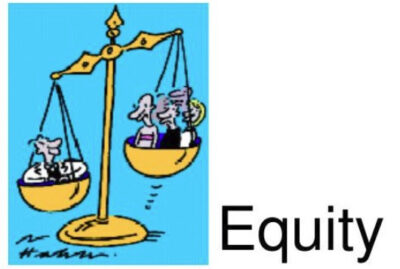Matters of Equity

It was early, but it isn’t now. Let’s get the definition thing out of the way, shall we? Merriam-Webster is an acceptable dictionary to many folks. It defines the word “equity” as “justice according to natural law or right; specifically: freedom from bias or favoritism.” We apparently are going to achieve this by imposing bias and favoritism in favor of selected groups of citizens, or even non-citizens who appeared here without actual invitation.
We took a brief but exhilarating sluice ride through one of the torrents of Federal money yesterday. It is actually only “Federal” after they take it from “us.” We started the quick analysis with a look at the Highway Trust, the one that funds the first third of the cost of roads, bridges and rails on which America rolls. It is situational, of course. If you happen to drive a company vehicle that happens to be “electric powered” in a region with long distances required and an inadequate number of charging stations, you might mutter at the words here on the screen. But that crisis- the one forcing us into expensive products that don’t work very well- is still down the road.
Or not, if you live in a place like East Palestine, Ohio, of course.
What surprised us (a bit) was how the Highway Trust Fund was never mentioned in the Big Infrastructure Bill that was, theoretically, supposed to fix it. The solution, or what we were told was a solution, was buried in a multi-trillion-dollar-bill (was it $1.2 Trillion or three or five?) with only about 10% of the initial tranche of cash actually devoted to rails and roads. There were a lot of other things that needed fixing, so the general scheme of the Bill was to jumble all of them together into a piece of legislation to big there was no time to discover what was in it until it headed to the Oval Office for signature into law.
That isn’t a complaint, mind you, it is just a description of how the system now works. We mentioned the mass-transit chunk of the Bill, which is intended to make public transportation more accessible to the riding public. In the old days, that would have involved some discussion about whether America wants to ride such things as a matter of public policy. That decision was made before we even learned about it.
We were going to go on with that, since similar issues are predicted by the Congressional Budget Office for Medicare (2030) and Social Security (2033). We expect the same sort of shenanigans to accompany “fixing” both of those Trusts. With the same process as the Infrastructure Bill, they will drag on through at least a couple budget cycles and involve early half the entire Federal Budget. You can be sure it will be both louder and bigger than roads and rails, and none of the underlying policy that caused the problems will come up in the noise and excitement.
An example is the Executive Order discussed in what passes for the Press this morning. The Chief Executive signed a bunch of stuff on his first day in office. There was some minor controversy about things like the Keystone Pipeline and others, but a favorite was the latest of more than a thousand “EO’s.” The one numbered “13985” was advertised to “Advance Racial Equity and Support for Underserved Communities Through the Federal Government.”
Some of us have heard this before. The Great Society of Lyndon Johnson was supposed to do some of the same stuff. In the older America, we actually talked about what the Government was attempting to do against the backdrop of a ground war in Vietnam. Fifty years and eighty assorted equity programs later, the cost of that Society has been nearly $22 trillion. Arguably, some of it worked. A lot of it didn’t.
That is not the cause, directly, of the public debt hanging at $31.4 Trillion dollars. It would be interesting to look back at the “Debt Ceiling” itself. That legislation limits the amount of cash the Federal government can borrow on our behalf. It is a product of some out of control spending in 1917, when America was preparing to join the Great War in Europe. Stop us if it seems sort of familiar!
We don’t know how much EO-13985 is supposed to cost, in either direct or indirect charges for compliance. That sort of information used to be considered relevant for discussion, but as noted, this order was issued unilaterally and without comment. Revamping the entire Executive Branch to include a new Diversity, Equity and Inclusion Corps to direct policy in all the Bureaus, Offices and Agencies would be worth a chat, you know? A national chat.
The actual conversation might be useful in making smart policy, which is why we no longer do it. We have a Congress that doesn’t discusses things like the budget. The amount of money the Members have to raise to stay in office takes up the time they used to spend on talking about the effect of the laws they pass. They are now simply reflected in bills so large and so urgent they are passed based mostly on the titlesof the multi-thousand pages new laws.
We will come back to this situation over the next decade as the future RBFDs we already know are coming are packaged in the manner best calculated to impose solutions that may- or likely do not- have a chance at fixing anything.
So, here we are. And what is likely coming at us.
We have changed our form of government. We used to think that was a topic worth talking about, but it happened while we weren’t looking. We were busy on our phones or something.
Copyright 2023 Vic Socotra
www.vicsocotra.com
